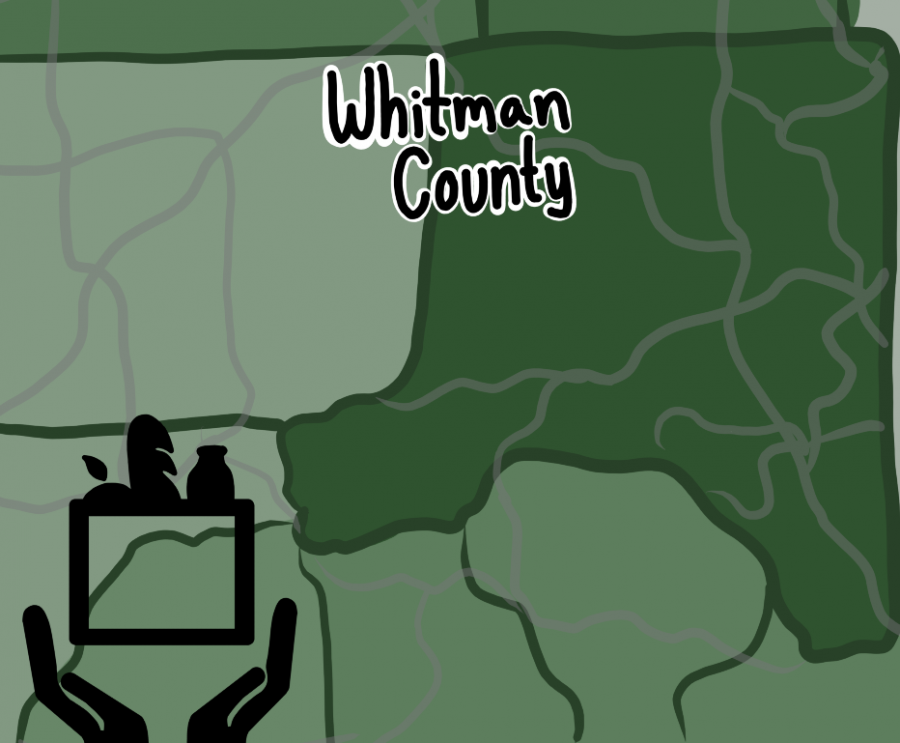OPINION: Bring awareness to food scarcity among students
Local food pantries hard at work to provide students with food security, even during pandemic
Campus resources supply a food pantry to students experiencing food-insecurity.
March 4, 2021
Pullman is home to, arguably, some of the deepest roots of college community, flowing with wheat fields, Cougar Gold cheese, Ferdinand’s ice cream and Coug pride.
But among us, living on College Hill and in our dorms, are students who are experiencing the realities of food scarcity.
In 2018, Whitman County was found to be the most food-insecure county in Washington with 13.4 percent of its citizens experiencing hunger, including students, according to Feeding America’s research. Although a large jump has been made to close that gap between the food-insecure and food-secure, COVID-19 has not helped those who work high-risk jobs to pay their bills.
What has helped, though, are the resources made available through WSU. There are many links and accessible resources both on and off-campus for students with or without a car.
Even in a pandemic, WSU is looking out for those who are most affected and often least noticed. We have to admit that food scarcity is not something we often consider when our refrigerators are full and our own tables are spread with variety.
Campus resources, like the Office for Access and Opportunity, are working to provide that same comfort to students by making a food pantry available on campus.
“I know that sometimes there’s stigma about, you know, going to access different resources. So providing another space that people could feel comfortable in and … trying to reduce the barriers to it … makes [the food pantry] easier to access,” said Hildegarde Velasco-Faga’autau, program coordinator for the Office of Access and Opportunity.
During COVID-19, this is all the more important for those who experience food scarcity. With that in mind, students like Natalie Drozdowski, one of the program leaders for Cougar Safe Rides, has taken the opportunity to help out her fellow Cougs.
Cougar Safe Rides was created to provide services to community members by offering reliable, safe transportation. But with a pandemic raging, this wasn’t quite possible.
“With COVID, we had to change our operations because servicing the community with transportation was not going to be safe with the regulations from the CDC,” Drozdowski said. “So we altered our program, and now we are working with the Women’s Center Food Pantry, in combination with [the Center for Civic Engagement], the Office of Access and Opportunity and the dean of students.”
This ability to pivot in a meaningful direction is an incredible asset of many small working businesses. Being able to help out fellow students by connecting them to much-needed resources is an admirable feat.
“We have been utilizing our dispatching system that we used for Safe Rides, and we’ve been using it to deliver pantry go-bags and COVID kits that students request,” Drozdowski said. “We are just making sure those pantry bags get out to students to ensure food security for them.”
Drivers like Drozdowski have also been able to work with organizations like the Council on Aging and their food pantry in Colfax, as well as Eggert Farm, which donates pounds of potatoes and shallots every week.
Donations like those from farms and excess stock at other food pantries allow ours to successfully provide students with good, healthy and desirable food.
“We have been trying to have really consistent bags, and then we have a section [on the request form] where they can do add-ons … any little things that they’re hoping to get, we try to build those out as much as we can,” Velasco-Faga’autau said.
Donations from students, parents and other Pullman residents help keep the food pantry stocked with basic items, as well as unique or sought-after items that might go quickly. But the most important aspect of making our community’s food pantry successful in its connection to students is getting the word out that it exists.
“I feel like [the food pantry] hasn’t been something that’s always been advertised very well to students,” Drozdowski said. “It’s one of those places you could just drop by while you’re on campus and pick up a snack … and I think getting the word out about it is going to be really important.”
The food pantry provided by the Office of Access and Opportunity is one that is available to all. Whether you are looking to stock your fridge on a tight budget, or for a snack less expensive than on-campus food when campus opens up again…WSU is working to provide for those who need the assistance!
We should all be working to spread the word about our resources and destigmatize food insecurity in our community. It is real, and it is not something any Coug should have to handle on their own.
When we claim to put our fellow Cougs first, we must be aware that this is no shallow promise. So many of our students are in need of community. We have clubs and organizations for that. So many are in need of financial support. We have scholarships and advisors for that.
So many of our students are experiencing food insecurity. We have food banks for that.
- To donate to the food bank on campus, please contact [email protected]
- For more information on poverty, hunger and homelessness in Whitman County and the U.S., visit the CCE website.









